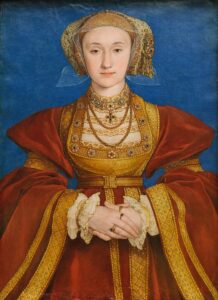 Anne of Cleves is often remembered as the wife Henry VIII described as having a face like a “Flanders mare,” yet there is so much more to this often-overlooked queen. Henry’s fourth wife may not have had the dramatic downfall of Anne Boleyn or the tragic fate of Catherine Howard, but Anne of Cleves played a pivotal role in Tudor history. In this article, we’ll explore Anne’s life, her marriage to Henry VIII, and why she is remembered as the queen who outlived them all.
Anne of Cleves is often remembered as the wife Henry VIII described as having a face like a “Flanders mare,” yet there is so much more to this often-overlooked queen. Henry’s fourth wife may not have had the dramatic downfall of Anne Boleyn or the tragic fate of Catherine Howard, but Anne of Cleves played a pivotal role in Tudor history. In this article, we’ll explore Anne’s life, her marriage to Henry VIII, and why she is remembered as the queen who outlived them all.
Anne of Cleves: A Diplomatic Marriage
Anne of Cleves was born on 22 September 1515 in Düsseldorf, Germany, into the House of La Marck, a powerful family with strong connections across Europe. As the daughter of John III, Duke of Cleves, and Maria of Jülich-Berg, Anne’s marriage to Henry VIII in 1540 was primarily a diplomatic alliance orchestrated by Thomas Cromwell. The political motive behind the marriage was to unite England with Protestant states in Germany and strengthen England’s position in Europe.
The Marriage and Henry’s Displeasure
Henry VIII agreed to marry Anne based on a flattering portrait by Hans Holbein the Younger, but upon meeting her in person, Henry was famously disappointed. He reportedly found her unattractive, and their marriage, which took place on 6 January 1540, was never consummated. Less than six months later, Henry sought an annulment, claiming the marriage was invalid due to Anne’s pre-contract to another man (though this contract had been resolved). Henry also alleged that Anne did not “excite” him.
The Clever Queen Who Survived
Despite the annulment, Anne of Cleves managed to secure a remarkable deal. She agreed to Henry’s request, and in return, she received generous settlements, including several palaces and an allowance. She was even given the honorary title of the “King’s Sister,” which granted her a respected place at court. Unlike Henry’s other wives, Anne had a peaceful post-marriage life. She lived comfortably in England, staying on good terms with Henry and his children.
Anne’s Legacy: The Queen Who Outlived Them All
Anne of Cleves outlived Henry VIII and all of his other wives, dying on 16 July 1557. She had successfully navigated the treacherous waters of Tudor politics and lived out her life in comfort and security. While Anne’s marriage to Henry was short, her legacy is one of survival and diplomacy.
FAQs About Anne of Cleves
- Why did Henry VIII marry Anne of Cleves? – Henry VIII married Anne as part of a political alliance with the Protestant states of Germany, hoping to strengthen England’s position against Catholic powers like France and the Holy Roman Empire.
- Why was Henry VIII disappointed with Anne of Cleves? – Henry was reportedly disappointed with Anne’s appearance, believing she looked different from the flattering portrait painted by Hans Holbein. However, some historians suggest this may have been an excuse to annul the marriage.
- How long was Henry VIII married to Anne of Cleves? – Henry VIII and Anne of Cleves were married for approximately six months, from January 6, 1540, to July 9, 1540.
- What happened to Anne of Cleves after the annulment? – Anne lived out her life peacefully in England after the annulment. She was given generous settlements, including Richmond Palace and Hever Castle, and was treated with respect as the “King’s Sister.”
- Did Anne of Cleves remarry? – No, Anne of Cleves never remarried after her annulment from Henry VIII.
- Why is Anne of Cleves known as the ‘Queen Who Outlived Them All’? – Anne outlived Henry VIII and all of his other wives, passing away in 1557, more than a decade after Henry’s death in 1547.
Conclusion
Anne of Cleves may not have had the most dramatic reign as queen, but her intelligence and pragmatism allowed her to survive where others did not. By negotiating a favorable settlement and remaining on good terms with Henry, Anne secured her place in history as a queen who lived a peaceful and prosperous life after her brief marriage. Her story is a reminder that sometimes, survival is the greatest triumph.